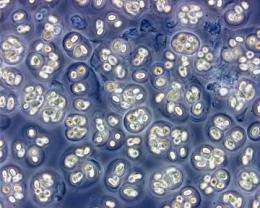Gloeocapsa viewed with phase contrast optics. Image credit: Connecticut College
(PhysOrg.com) -- Bacteria collected from rocks taken from the cliffs at the tiny English fishing village of Beer in Devon, have survived on the outside surface of the International Space Station for 553 days. The bacteria, known as OU-20, resemble cyanobacteria called Gloeocapsa.
The rocks were placed on the outside of the European Space Agency's technology exposure facility at one end of the space station. The small chunks of Beer cliff had microbes inside and on the outside of the rocks. During their year and a half outside the space station they would have had to endure extreme shifts in temperature, exposure to cosmic rays and ultraviolet light. Not only is the environment anaerobic, but the vacuum of space would also have caused all the water in the rocks to boil away.
Professor Charles Cockwell of the Open University (OU) Planetary and Space Sciences Research Institute, which ran the experiment, said said the Beer rocks contained a range of "everyday organisms," but part of the reason the OU-20 microbes survived could be that they form a multi-celled colony that would protect the cells in the center. They also have a thick cell wall that could help them survive. The species is related to bacteria surviving in Antarctica and in deserts, so Cockwell said he suspects they have good DNA-repair processes as well.
The experiment was one of several designed to find out if bacteria can be useful to future astronauts exploring the solar system. Among the proposed uses are recycling in life support systems, and bio-mining, or using microbes to extract minerals from rocks on the moon or Mars.
The survival of so many of the bacteria in such a hostile environment with no oxygen adds weight to the hypothesis that microbes carried in meteors and meteorites could seed life on other planets or moons.
Bacterial spores have been shown to be capable of surviving for years in orbit, but this is the first time photosynthesising bacteria, the cyanobacteria, have been demonstrated to be able to survive so long in space. An earlier experiment, Biopan-6, carried out by Russian astronauts, showed OU-20 bacteria and a group of tiny "water bears" were able to survive outside the space station for 10 days.
The surviving bacteria were brought back to Earth and are now thriving in an OU laboratory in Milton Keynes.
© 2010 PhysOrg.com





















